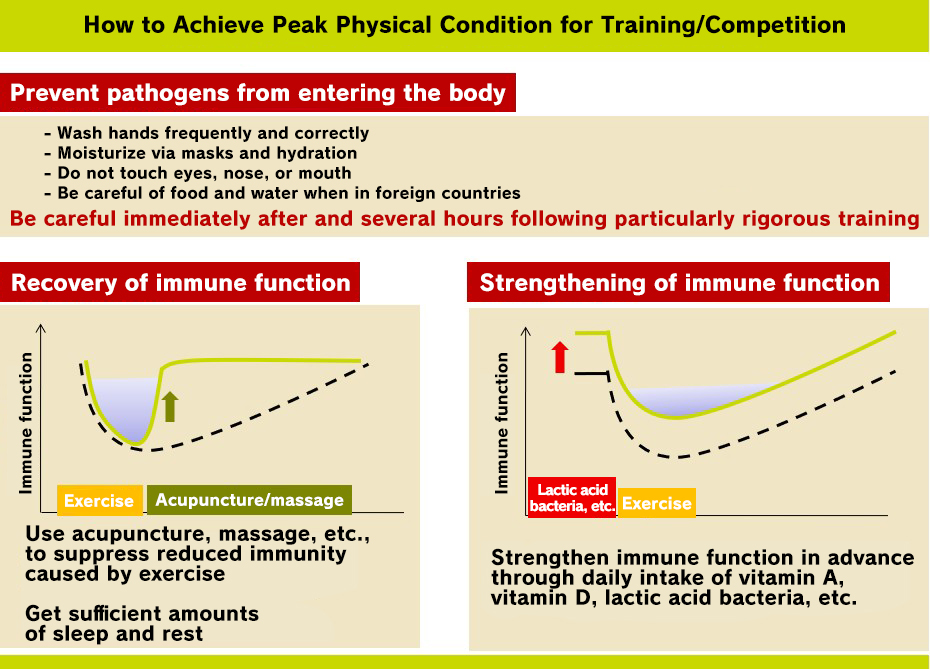

Athletes need to exercise rigorously on a daily basis in order to achieve a high level of performance in competition. However, excessive amounts of long-term and high-frequency exercise not only lead to poor athletic performance and chronic fatigue, but also increase the risk of contracting upper respiratory tract infections (cold, influenza, etc.). Avoiding upper respiratory tract infections is essential in order to be in peak physical condition for daily training and competitions, and preventative measures must be taken at an early stage. Additionally, infectious diseases are not only a problem for the infected individual, but can also infect other athletes and support staff. This spread may cause the competitive ability of the entire team to decline. Therefore, maintaining good physical condition among support staff, taking measures to prevent infection, and implementing isolation measures for infected individuals are also of great importance.

Secretory immunoglobulin A (SIgA) is the main component of mucosal immunity (barrier function). SIgA is present in secretions such as saliva and nasal discharge in order to prevent the invasion of pathogens and neutralize toxins. Decreased SIgA in saliva has been shown to increase the risk of upper respiratory tract infections. Salivary SIgA decreases with high-intensity exercise. The longer the exercise time, the longer required to recover the SIgA level. Furthermore, salivary SIgA continues to decrease with continued high-intensity exercise. Other factors leading to a decrease in salivary SIgA include stays in high altitudes, weight loss associated with dehydration, amenorrhea, and long-distance travel. This indicates that athletes are placed in an environment in which their immune function is prone to decrease.
I would like to introduce the simple method of focusing on subjective signs associated with a decrease in SIgA. The barrier function is likely to have deteriorated in times such as the following: (1) you feel more tired than usual, (2) you have more trouble falling asleep and waking up than normal, and (3) you feel thirsty even after drinking water. Risks can be reduced by taking measures against infection.
First of all, preventing pathogens from entering the body is an important measure against infection. Examples include avoiding crowds, refraining from carelessly touching surrounding objects, and not touching your mucous membranes such as the eyes, nose, and mouth. Moreover, it is recommended to thoroughly wash your hands, especially between the fingertips, nails, and fingers, which are areas prone to being left unwashed. Moisturizing mucous membranes with a mask or hydration is also important because drying of mucous membranes leads to a decrease in the barrier function. Increasing the humidity (approximately 60%) is also important because low humidity in a room will dry out and lighten droplets containing viruses, thus enabling them to be carried farther.

It is possible to recover the weakened immune function. Activities such as massage, acupuncture, taking baths, etc., are effective in increasing SIgA. It is important that you feel “comfortable” (dominance by the parasympathetic nerves) during these activities. Relaxing and laughing are also good for immune function.
Reducing the intensity and duration of training below the normal amount also leads to recovery of immune function. Furthermore, endurance exercise is more likely to lower the immune function than resistance exercise. Accordingly, if you feel any symptoms of weakened immunity, you should change your training routine; for example, change from long-distance running to short-distance running (even at high intensity) or to weight training. Paying attention to preventing decrease and promoting recovery of immune function can reduce the risk of infection.
Vitamin A and vitamin D are involved in the synthesis and regulation of SIgA. Therefore, you should try to ingest sufficient amounts on a daily basis. The SIgA enhancing effect of lactic acid bacteria is also attracting attention. It has been reported that arachidonic acid derived from vegetable oil reduces the risk of upper respiratory tract infections and that palmitic acid increases SIgA production.
What kinds of conditions cause the immune function to decrease? What kind of people have a low immune function? What kind of signs are exhibited when immunity has decreased? What kind of measures should be taken when those signs are observed? What precautions should be taken on a daily basis?—The risk of infection can be reduced by ascertaining such information and then taking appropriate measures. Implementing even a few of the suggestions made in this article will enable athletes to enter important phases of their training and competition in peak physical condition.
|